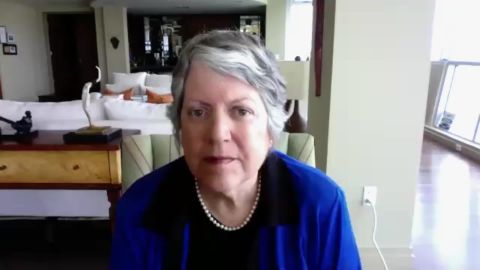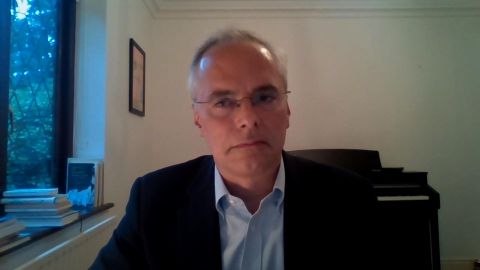Read Transcript EXPAND
CHRISTIANE AMANPOUR: Just from your expertise, describe how this mixed messaging is potentially a problem as we see this surge of cases.
HATCHETT: Well, any time you have mixed messaging, it can produce confusion, obviously. So, we do want to be very clear in our guidance to the public about the steps that they can take to protect themselves, to protect their family members and to protect other members of their community. And I think the underlying idea behind social distancing measures, behind the idea of wearing masks, behind the idea of, you know, good personal hand hygiene and — you know, is that we are all in this together and that the behavioral choices that individuals make and that groups make have a huge impact on disease transmission. And people need to understand that while we don’t have definitive treatments or vaccines, these are the kinds of measures that we’re all going to have to adopt if we are going to suppress transmission and keep the rates of disease, and of course keep the rates of death, down as low as we possibly can.
AMANPOUR: So, again, I just want to refer to Dr. Fauci who, as you know, and as we all now know, seems to be in some kind of battle of credibility with the White House. And he’s using other avenues to get very serious and important messages across. Allegedly he seems to have not briefed the president by his own admission for two months, although apparently in touch with the vice president’s task force. But here’s what he said just now. A misstep in communicating to the public the benefits of mask wearing early on has hurt its credibility as a public health tool. Do you agree with that, first, and would you urge people to just do it now in the absence of treatment and vaccines?
HATCHETT: Oh, I absolutely would. I think the emerging data is highly supportive of the idea that if communities adopt mask wearing as a general behavior, disease transmission goes down. And whether that’s because the mask is preventing infected people from, you know, releasing COVID-19, you know, into the air, whether it protects people, whether it reminds people that they are in the midst of a pandemic or all of those things together, which is probably the case, mask wearing clearly provides benefits to communities that are facing outbreaks. So, I would urge people to adopt mask wearing as a behavior that we’re just going to have to all get used to during this period when we don’t have vaccines.
About This Episode EXPAND
Epidemic expert Richard Hatchett gives an update on efforts to develop a COVID-19 vaccine. Khalil Gibran Muhammad discuss racism, mass incarceration and the war on drugs. Janet Napolitano, the president of the University of California, discusses the state of higher education amidst the pandemic.
LEARN MORE


